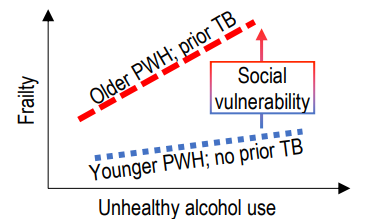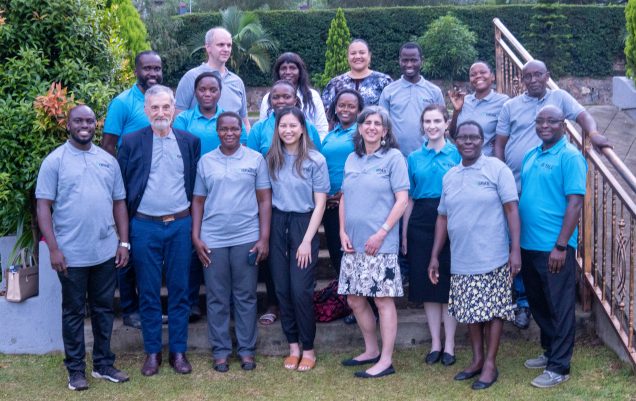TB, HIV, and Aging in Uganda: The THAU 50/50 Study
In this issue of URBAN ARCH News, we highlight the affiliated, NIAAA-funded TB HIV Aging in Uganda 50-over-50 (THAU 50/50) study. In August 2023, the TALC study team responded to a Notice of Special Interest: Administrative Supplements for HIV/AIDS and Aging Research and received supplemental funding ($377,296) to launch the THAU 50/50 study in Mbarara, Uganda. The THAU 50/50 study will build on the infrastructure of the TALC study to accomplish the following specific aims:
- Determine the association between lifetime alcohol exposure and frailty and explore whether a) aging; b) history of TB disease moderates this association among PWH.
- Determine the association between social vulnerability and a) aging; b) history of TB disease in PWH.
- Qualitatively elicit health priorities and opportunities for differentiated healthcare delivery among older PWH with prior TB or unhealthy alcohol use.

This supplemental study will enroll 50 new participants without TB over 50 years of age. Questionnaires will be used to collect information about participants’ demographics, social vulnerability, alcohol use, and overall health, including age-related comorbidities and other challenges. Participants will also be asked to undergo spirometry and DLCO testing, a measure of lung function, as well as a chest CT scan to assess for lung abnormalities. In addition, participants will provide blood for CD4 testing and dried blood spots. This data will then be used as a comparator for TALC participants over age 50, who will provide the same information through their participation in the TALC study. The primary outcomes for Aim 1 include a frailty index and the Fried frailty phenotype; the primary outcome for Aim 2 is a social vulnerability index. Primary exposures include lifetime alcohol use, as measured by the lifetime drinking history questionnaire (Aim 1), as well as chronological age and prior documented history of TB disease (Aim 2).
For Aim 3, the study team will conduct qualitative interviews with TALC study participants over age 50 as well as other key informants, in order to assess engagement and satisfaction with healthcare for HIV across the lifespan. These interviews will focus on aspects that are relevant to the lives of older and multimorbid PWH – notably frailty, discrete diseases of aging, the roles of TB and substance use, and the impact of social vulnerabilities on health at an older age. Through talking with participants, the team hopes to explore lived experiences and the context of care for older PWH in Uganda, to ultimately enable the development and implementation of age-appropriate, integrated HIV/geriatric care in this setting.

The study team is comprised of a diverse group of investigators, clinicians, and staff with varied experiences and expertise in the areas of HIV, aging, alcohol, substance use, and more. Dr. Kaku So-Armah, project lead for the TALC study, will also lead the THAU 50/50 study. Dr. Winnie Muyindike, site PI for the TALC study, will also serve as site PI for the THAU study. Dr. Karsten Lunze, co-investigator for the TALC study, will also serve as a co-investigator for the THAU study. The Biostatistics and Data Management Core, led by Dr. Debbie Cheng, and the Boston University School of Public Health Biostatistics and Epidemiology Data Analytics Center (BEDAC) will provide data management and statistical support for the THAU study. The sub-study will be coordinated in Mbarara by Naomi Sanyu, who is also the field coordinator for TALC. The team has also welcomed some new collaborators for this study, notably Dr. Theresa Kim and Dr. Sylvia Shangani.

Dr. Theresa Kim is Clinical Associate Professor at Chobanian and Avedisian School of Medicine and clinician-investigator in the Section of General Internal Medicine at Boston Medical Center. Dr. Kim’s research has focused on improving access to quality primary and addiction care for marginalized populations.

Dr. Sylvia Shangani is an Assistant Professor in the Department of Community Health Sciences at the Boston University School of Public Health. She is also a visiting research scientist at Yale University School of Public, Department of Social and Behavioral Sciences. Her primary research is focused on HIV prevention and social vulnerability in sub-Saharan Africa and the United States. Read more about Dr. Shangani in this issue’s spotlight interview.
When asked how she feels about the upcoming study, Dr. Winnie Muyindike shared, “The TALC Mbarara team is very excited about the incoming THAU 50/50 study. We are enthusiastic to start work on THAU 50/50. [It] delights me immensely that persons with HIV (PWH) above 50 years of age are prioritized to participate in this important study. THAU will unlock the dearth of information that will improve our understanding about the synergistic burdens of aging among PWH in Uganda, a country burdened with infectious conditions like tuberculosis, social vulnerabilities like high levels of unhealthy alcohol use and… increasing diseases of aging (e.g., hypertension). Bridging these gaps will enable us to surmount the next barrier to extending quantity of life and improving quality of life for aging PWH.”
The team is currently in the process of obtaining IRB approvals for study activities. The BEDAC team is beginning to build data collection forms for the study. The THAU 50/50 study team hopes to begin recruitment in Summer 2024, and they are excited to see how this study will strengthen and build upon the work of the TALC study!